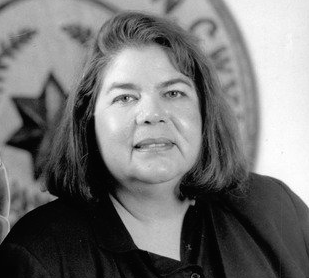Native American Heritage Month: Wilma Mankiller

Image from the New York Times’ April 6, 2010 obituary
RHAP’s first feature of #NativeAmericanHeritageMonth is the resilient Wilma Mankiller (1945-2010), the first woman principal chief of the Cherokee Nation, which is the second largest tribe in the United States. Born in Tahlequah, Oklahoma, to a Cherokee father and Dutch-Irish mother, her family relocated to San Francisco under the Bureau of Indian Affairs’ Relocation Program. Their mission was to mobilize assimilation into American cities by sending them off their reservations, thus “freeing” them, and by doing so, increase the hopes of finding jobs. Although poor in Oklahoma, Mankiller fondly remembered community, something that was vastly missing when she went to the Bay Area, and referred to this as her own personal “Trail of Tears” in her 1993 autobiography. The level of destituteness that her family faced once they moved, along with isolation, was a pivotal point in her life.
Her political activism began in her twenties. Already married and a mother of two, Wilma began rallying with organizers such as the Black Panther Party to feed elders and children. It wasn’t until her relocation to California that she was exposed to the mistreatment of African Americans and wanted to fight for racial justice. Shortly after, in November 1969, members of the American Indian Movement occupied Alcatraz Island on the ground of the Treaty of Fort Laramie (which stated that all abandoned federal land would be returned to the Native people who once lived there). Wilma split her time between the island and the American Indian Center in San Francisco. In her autobiography, Mankiller stated that “Throughout the Alcatraz experience and afterward, I met so many people from other tribes who had a major and enduring effects on me. They changed how I perceived myself as a woman and as a Cherokee.”
In the late seventies, she moved back to Oklahoma with her two daughters and began working for the Cherokee Nation. Mankiller founded the Community Development Department that initiated and completed projects related to community water systems and housing. She became the deputy chief in 1983 as running mate with Principal Chief Ross Swimmer. He left his position in 1985 and she assumed the title, and won re-elections in 1987 and 1991.
Her tenure was accomplished due to a doubling of enrollment in the tribe, increased housing, employment, new health centers (resulting in a decrease in infant mortality), economic sustainability, revitalizing the Cherokee judicial system amongst a plethora of other feats.
Her lifelong career of activism continued once she left office in 1995. Wilma’s dedication to women’s rights, civil rights, and her devotion to attaining rights for all tribal nations throughout Indian Country was her principal life’s work up until her death in 2010 from pancreatic cancer.
